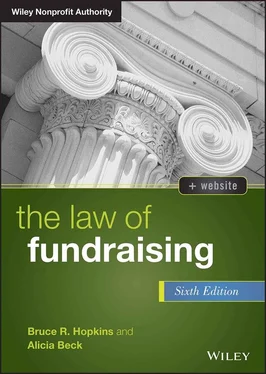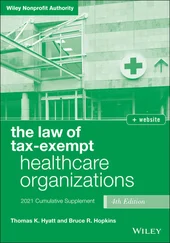Bruce R. Hopkins - The Law of Fundraising
Здесь есть возможность читать онлайн «Bruce R. Hopkins - The Law of Fundraising» — ознакомительный отрывок электронной книги совершенно бесплатно, а после прочтения отрывка купить полную версию. В некоторых случаях можно слушать аудио, скачать через торрент в формате fb2 и присутствует краткое содержание. Жанр: unrecognised, на английском языке. Описание произведения, (предисловие) а так же отзывы посетителей доступны на портале библиотеки ЛибКат.
- Название:The Law of Fundraising
- Автор:
- Жанр:
- Год:неизвестен
- ISBN:нет данных
- Рейтинг книги:4 / 5. Голосов: 1
-
Избранное:Добавить в избранное
- Отзывы:
-
Ваша оценка:
- 80
- 1
- 2
- 3
- 4
- 5
The Law of Fundraising: краткое содержание, описание и аннотация
Предлагаем к чтению аннотацию, описание, краткое содержание или предисловие (зависит от того, что написал сам автор книги «The Law of Fundraising»). Если вы не нашли необходимую информацию о книге — напишите в комментариях, мы постараемся отыскать её.
The Law of Fundraising
The Law of Fundraising
The Law of Fundraising — читать онлайн ознакомительный отрывок
Ниже представлен текст книги, разбитый по страницам. Система сохранения места последней прочитанной страницы, позволяет с удобством читать онлайн бесплатно книгу «The Law of Fundraising», без необходимости каждый раз заново искать на чём Вы остановились. Поставьте закладку, и сможете в любой момент перейти на страницу, на которой закончили чтение.
Интервал:
Закладка:
Your senior author then telephoned Rep. Van Deerlin's office, hoping to find a dedicated staffer toiling there on a Saturday morning. Times were much different then: the call was answered by the congressman himself. It turned out that there was no impending hearing—rather, an informal briefing on a proposed bill was scheduled to be conducted, in Rep. Van Deerlin's office, for interested (and concerned) persons. He attended the briefing the following week, spoke up, found himself appointed to an ad hoc group formed to revise the proposal, and thus innocently wandered into the ambit of government regulation of fundraising for charity.
As the result of that client call, there unfolded innumerable meetings, telephone calls, hours of research, hearings, task forces, new nonprofit organizations, proposals, legislation, and a swirl of other developments that evolved into the contemporary body of law directed at solicitations of contributions for charitable purposes. Congressman Van Deerlin's effort to create federal statutory law in this field was unsuccessful, but certainly the pace and form of fundraising law was hardly abated.
The junior author's interest in the law of fundraising commenced in a University of Kansas School of Law classroom in the fall of 2008. The senior author had relocated his practice to Kansas City and began teaching at KU Law; the aforementioned class was his first one there. The course was a basic one on nonprofit and tax-exempt organization law, with some attention to charitable fundraising. The junior author was drawn to the intricacies of nonprofit law, earning the highest grade in the course. Four years later, your two authors began practicing law together; this book evolved from that relationship. Today, the junior author is a bank vice president, while the senior author continues in private practice. Your junior author, Alicia Beck, expresses her appreciation for the opportunity to practice with her former professor.
This edition of the book reflects an extensive revision of the previous volume. Yes, coverage has expanded again, with considerable rewriting and restructuring. The book demonstrates expansion of fundraising law on all fronts: accumulating legislation, tax regulations, IRS rulings, and case law. The U.S. Supreme Court has contributed to the shaping of this body of law, beginning with its landmark opinions in the 1980s and continuing through its finding in 2021 that state law disclosure requirements concerning donor information are unconstitutional.
Our thanks go to those who have made interesting and useful contributions to the book: James J. Bausch, James M. Greenfield, Richard F. Larkin, Paul E. Monaghan, Jr., David Ormstead, and Del Staecker. Analysis and commentary that we have written here should not, of course, be attributed to them.
Thanks go as well to those at John Wiley & Sons who have, over the years, seen editions of this book and/or their supplements to completion. In the past, gratitude and appreciation have been extended to Marla Bobowick, Martha Cooley, Jennifer MacDonald, Susan McDermott, Brian T. Neill, Claire New, and Deborah Schindlar. Our thanks are extended, this time around, to our development editor, Brian Neill, and Deborah Schindlar, managing editor, for their assistance and support in connection with this edition of the book.
Bruce R. Hopkins
Alicia M. Beck
November, 2021
CHAPTER ONE Government Regulation of Fundraising for Charity
§ 1.1 Charitable Sector and American Political Philosophy
§ 1.2 Charitable Fundraising: A Portrait (a) Scope of Charitable Giving in General (b) Noncash Gifts Statistics (i) Form 8283 Reporting (ii) Types of Noncash Contributions (iii) Decline in Returns and Amounts (iv) Average Contribution Amounts (v) Types of Charitable Organizations (c) Online Charitable Fundraising
§ 1.3 Brief History of Government Regulation of Fundraising
§ 1.4 Contemporary Regulatory Climate
Charitable organizations are an integral part of U.S. society; many of them must engage in the solicitation of contributions and grants to continue their work, which benefits that society. Yet both these organizations and their fundraising efforts are under constant criticism and immense regulation. Some of this regulation comes from the many state charitable solicitation acts —statutes that are designed to regulate the process of raising funds for charitable purposes. Other aspects of this regulation are found in the federal tax law, with mounting legislation and application of legal principles by the Internal Revenue Service 1 and the courts. Increasingly, other federal laws are contributing to the overall mass of regulation of charitable fundraising.
One of the pressing questions facing philanthropy in the United States is whether this form of regulation is far too extensive and thus whether it is unduly stifling the nation's independent and voluntary sector. Another attitude is that charity, and fundraising for it, has become a major “industry,” and warrants regulation to minimize abuse, protect prospective and actual donors from fraud and other forms of misrepresentation, and reduce waste of the charitable dollar.
Before examining the extent of this regulation, and the accompanying contemporary issues and trends, the role of charitable organizations must be placed in its historical and public policy context.
§ 1.1 CHARITABLE SECTOR AND AMERICAN POLITICAL PHILOSOPHY
Because modern U.S. charity evolved out of the common law of charitable trusts and property, and has been accorded exemption from income taxation since the beginning of federal tax policy and gifts to charity are tax-deductible, the contemporary treatment of charitable organizations is understandably fully reflected in the federal tax laws.
The public policy rationale for exempting organizations from tax is illustrated by the category of organizations that are charitable, educational, religious, scientific, literary, and similar entities, 2 and, to a lesser extent, social welfare organizations. 3 The federal tax exemption for charitable and other organizations may be traced to the origins of the income tax, 4 although most of the committee reports accompanying the 1913 act and subsequent revenue acts are silent on the reasons for initiating and continuing the exemption.
One may nevertheless safely venture that the exemption for charitable organizations in the federal tax statutes is largely an extension of comparable practice throughout the whole of history. Congress believed that these organizations should not be taxed and found the proposition sufficiently obvious as not to warrant extensive explanation. Some clues may be found in the definition of charitable activities in the income tax regulations, 5 which include purposes such as relief of the poor, advancement of education or science, erection or maintenance of public buildings, and lessening of the burdens of government. The exemption for charitable organizations is clearly a derivative of the concept that they perform functions that, in the organizations' absence, government would have to perform; therefore, government is willing to forgo the tax revenues it would otherwise receive in return for the public services rendered.
Since the founding of the United States, and earlier in the colonial period, tax exemption—particularly with respect to religious organizations—was common. 6 Churches were openly and uniformly spared taxation. 7 This practice has been sustained throughout the nation's history—not only at the federal but also at the state and local levels, most significantly with property taxation. 8 The U.S. Supreme Court, in upholding the constitutionality of the religious tax exemption, observed that the “State has an affirmative policy that considers these groups as beneficial and stabilizing influences in community life and finds this classification [exemption] useful, desirable, and in the public interest.” 9
Читать дальшеИнтервал:
Закладка:
Похожие книги на «The Law of Fundraising»
Представляем Вашему вниманию похожие книги на «The Law of Fundraising» списком для выбора. Мы отобрали схожую по названию и смыслу литературу в надежде предоставить читателям больше вариантов отыскать новые, интересные, ещё непрочитанные произведения.
Обсуждение, отзывы о книге «The Law of Fundraising» и просто собственные мнения читателей. Оставьте ваши комментарии, напишите, что Вы думаете о произведении, его смысле или главных героях. Укажите что конкретно понравилось, а что нет, и почему Вы так считаете.












